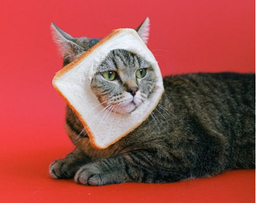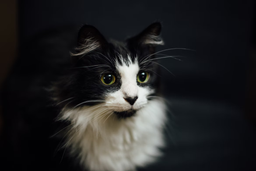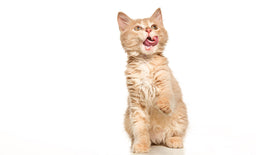Can cats eat raspberries, or should they avoid this sweet delight?
Raspberry is a healthy treat consumed in plenty of households across Britain. If you noticed your cat being curious about this refreshing fruit and maybe even trying to eat a raspberry or two, you’re probably wondering, “can cats eat raspberries, or are they toxic to felines?”
Untamed explores the matter and provides additional information about feline nutrition—what they are supposed to eat and what they shouldn’t consume under any circumstances.
What’s in a raspberry?
Raspberries are considered super healthy, full of numerous micronutrients with high bioavailability. Check out the table below for the nutritional value of this red delight:
|
Nutrient |
Amount per 100 grams |
|
Protein |
1.2 grams |
|
Fat |
0.7 grams |
|
Sugar |
4.4 grams |
|
Fibre |
7 grams |
|
Sodium |
1 milligram |
|
Potassium |
151 milligrams |
Raspberries are also rich in:
- Vitamin A
- Vitamin C
- Vitamin E
- Vitamin B6
- Manganese
- Iron
- Calcium
Even though raspberries are excellent for humans, they may not be the best choice for your cat because feline biology is significantly different. Let's examine how this fruit affects your kitty's health.

Raspberries are a human superfood, but they may not be as good for felines!
Source: Daily Slowdown
Are raspberries safe for cats?
Cats are obligate carnivores, so their bodies are designed to process meat. Felines thrive on a diet rich in:
- Animal protein
- Animal fat
- Vitamins and minerals
Raspberries won’t provide any essential nutrients to cats besides certain vitamins and minerals. Even if you decide to feed this fruit to your cat as a natural vitamin supplement, felines lack the necessary enzyme to process plants. They won’t be able to absorb the nutrients from any plant products, including raspberries.
While raspberries aren’t the proper food for your furry friend, they are safe as long as they’re offered in moderation and occasionally.
In most cases, cats won’t be attracted to raspberries because they don’t have the taste receptors for sweetness, and the aroma isn’t particularly alluring to them. If your cat likes the fruit for any reason, don't feed it to them more than once every few weeks. Frequent consumption of this fruit can cause stomach upsets.
What are the pros and cons of raspberries in your cat’s diet?
Your cat won't be able to absorb the nutrients from raspberries, but the popular fruit might be beneficial for:
- Hydration—85% of raspberry is water. Feeding them raspberries in small quantities may quench your feline's thirst for a while. You can even treat them to a frozen raspberry as a refreshment on a hot summer day. Remember that your kitty should get their moisture from their regular meals, so don't rely on raspberries too much
- Digestion—If your kitty is suffering from constipation, raspberries might help. Due to their high fibre content, raspberries can soften your feline companion’s stool. Keep in mind that your furry friend probably won't be too keen on the fruit
Let’s explore the cons of feeding felines raspberries:
- Raspberries can cause gastrointestinal issues—Due to their high fibre content, raspberries can cause gastrointestinal distress, such as vomiting and diarrhoea. If your furry companion already has a sensitive stomach, it’s best to keep them away from this fruit
- Xylitol in this fruit is poisonous—Xylitol, a sweet-tasting crystalline used as an artificial sweetener in human products, is highly toxic to cats. Raspberries contain tiny amounts of xylitol, and this is why they need to be offered in small quantities. Even as little as 50 milligrams of xylitol can be poisonous to felines

I don’t like your cereal. I’ll pick out all the raspberries, though!
Source: Alexas Photos
What happens if a cat eats raspberries too often?
Raspberries have antioxidants that could potentially slow down the ageing process, but unfortunately, cats can never eat enough of this fruit to get that benefit. Excessive consumption of raspberries can lead to:
- Vitamin C overdose—Too much vitamin C can cause an imbalance of the pH levels in your kitty’s digestive system, causing GI distress
- Obesity—Raspberries are an excellent food for cat parents who want to lose weight, but the fruit has the opposite effect on cats. The sugar content in raspberries can cause your furry friend to gain unnecessary weight. It can also lead to diabetes and dental issues
Some cat parents use raspberries to help underweight kitty gain some weight. But the better and healthier option would be lean meat.
How to feed raspberries to your furry friend safely
Should you decide to treat your feline to raspberries, make sure to:
- Wash the fruit in cold water for at least three minutes (to remove dirt and pesticides)
- Cut the raspberry in small bits (either in two halves or even smaller pieces depending on your cat’s size)
Do not feed more than two raspberries at a time to avoid health issues.

Hello, human, I came here for the chin scratches!
Source: Bofu Shaw
What about products containing raspberries?
You should refrain from sharing raspberry ice cream, frozen yoghurt, and similar delicacies with your feline companion as these human treats can be bad for their health. Besides increasing the risk of GI distress and obesity, sugary treats can lead to diabetes and tooth decay. If you still want to share your food with your kitty, read the label carefully to make sure the product doesn’t contain:
- Nuts—Nuts may trigger severe allergic reactions in cats. They can also be highly toxic (macadamia nuts). If you’re unfamiliar with your kitty’s allergies, avoid feeding them anything containing nuts
- Artificial sweeteners—Many human products contain artificial sweeteners, and they can lead to toxicosis in cats
- Dairy—Most cats are lactose intolerant, so any dairy product can cause digestion and GI issues. You can offer some plain yoghurt to your furry friend occasionally as it is a natural probiotic, but avoid dairy products made with raspberries as they probably contain sugar and lactose
- Yeast—Any food with yeast as an additive is off-limits for cats. Yeast can ferment in your kitty’s tummy and turn into alcohol, which is highly toxic to cats and can lead to kidney failure, coma, and death
Fruits cats can eat
Here's a list of fruits that are safe for cats. Keep in mind that your feline companion won't benefit from them and that frequent consumption is not advised:
- Strawberries—When you offer strawberries to your cat, remove stems and leaves because they can be toxic to felines. Due to high sugar levels, strawberries should be an occasional treat served in moderation
- Apples—Cats can eat apples, but you must remove stems and seeds before serving them to your furry friend
- Apricots—Small amounts of apricots are safe for cats, but you must remove the seed as it is highly toxic to cats
- Bananas—Cats can eat bananas as long as the portions are small. You can also offer frozen bananas to your furball
- Watermelon—Cats can eat watermelon flesh in small amounts, but it mustn’t contain any seeds as they are a choking hazard
- Mango—You may offer small, bite-sized cubes of mango flesh to your kitty occasionally, but remove skin and seeds
- Pineapple—If you’re feeding pineapple to your furry friend, remove leaves, thorns, and rind. Make sure that the pineapple is fresh as canned products are full of sugar and preservatives
- Cantaloupe—Cantaloupe has an enticing scent and is alluring to cats because of its meaty aroma. The good news is that your kitty can eat this fruit safely but only occasionally and in small amounts
Fruits cats shouldn’t eat
Check out which fruits your kitty shouldn’t eat:
- Citrus fruits—Fruits like lemons, oranges, clementines, grapefruit, and limes are toxic to cats and can cause vomiting, diarrhoea, and depression
- Grapes and raisins—These fruits can cause kidney failure in cats, so make sure your feline companion doesn’t have access to them. Besides renal problems, consumption of grapes and raisins can also lead to vomiting, diarrhoea, and lethargy
What about cats and vegetables?
Some vegetables are so toxic to cats that even the tiniest amounts can be lethal. The most dangerous are:
- Allium vegetables—Garlic, onions, shallots, and other allium vegetables are highly toxic to felines as they attack and destroy red blood cells. Consuming even the smallest amount can lead to anaemia. If your furry friend ingests an allium vegetable, visit a vet immediately
- Tomatoes—Cats shouldn’t eat tomatoes as they contain solanine, a natural pesticide highly poisonous to cats. Consuming tomatoes can cause diarrhoea, vomiting, lethargy, disorientation, appetite loss, dilated pupils, and excessive drooling
If you have a veggie-loving cat, here’s what’s safe for them:
- Peas—This veggie is safe for feline consumption, and some manufacturers use it as a filler in their food. It doesn’t mean that your kitty’s regular diet should include peas. Small amounts are not dangerous but cook the vegetable before serving
- Broccoli—Broccoli is high in fibre, which makes it excellent for regulating bowel movement. If your cat prefers broccoli over grass, offer them this veggie from time to time. It also needs to be cooked before serving
- Cucumber—You may serve raw cucumber during the hot summer months. This veggie will satiate your kitty’s thirst, but make sure not to go overboard as too much cucumber can cause diarrhoea and vomiting
- Pumpkin—Some vets claim that pumpkin is excellent for cats who suffer from constipation. As it is high in fibre, it can help in regulating bowel movement. Pumpkin needs to be served seedless and cooked
- Carrots—Carrots are rich in vitamins A, K, and B6, which are excellent for eyesight, but your kitty won't be able to absorb them efficiently. If you opt for carrots as an occasional treat, make sure they’re cooked as raw carrots can obstruct your kitty’s airways, causing them to choke
What should your cat eat?
As cats are natural carnivores, they can only thrive on a whole-meat-based diet. Check out the table below for the optimal nutrient ratio in your cat's diet:
|
Nutrient |
Recommended amount |
|
Animal protein |
Over 50% |
|
Animal fat |
Up to 20% |
|
Carbohydrates |
Less than 3% |
Animal protein is important for cats because it contains essential amino acids, like taurine and arginine, vital for normal pregnancy, regular bowel movement, good eyesight, adequate immune response, and efficient heart function. As cats cannot synthesise all amino acids, they need to obtain them from animal protein, which is also the best energy source for cats.
Animal fat provides healthy fatty acids like arachidonic acid, linoleic acid, omega-3 and omega-6, crucial for maintaining cell membranes, nutrient absorption, healthy skin, and shiny coat. Fat also improves the taste of any meal because cats find it delicious.
Cats don’t need carbs in their diet, and their bodies cannot process them efficiently. You should avoid products that contain too many carbohydrates (such as dry food) because a carb-rich diet can lead to obesity.

I don’t want raspberries, hooman! I want some nice chicken or fish!
Image (c) Untamed
Why is wet food better than cat kibble?
Even though cat biscuits are more affordable, dry food is a subpar option for your feline. It can lead to dehydration as it lacks the necessary moisture. Cats need at least 70% moisture in their diet, and only wet food offers an adequate amount.
Kibble is also bad for cats because it is heavily processed and doesn’t provide the essential nutrients. Most dry food products contain meat derivatives, vegetables, and grains, which are bad for cats in the long run.
Biscuits may help with dental health, according to some vets. If you decide to use dry food in your cat's diet, combine it with wet food. Your kitty will maintain their oral health and get the much-needed moisture and nutrients.
The amount of wet food you serve must correspond with your cat’s size, weight, age, and lifestyle. Nutritionists suggest you feed your kitty twice a day.
Opt for high-quality wet food with the following protein sources:
|
Protein source |
Bioavailability index |
|
98% |
|
|
94% |
|
92% |
Keep in mind that beef, pork, ham, and bacon have too much fat and should be offered as snacks rather than regular meals.

Wet food is the best for your furry friend because they will get the much-needed moisture from it!
Image (c) Untamed
Should my cat eat raw food?
Some cat parents think that a raw food diet (B.A.R.F. meal plans) is appropriate for felines since wild cats hunt their food and eat it raw. Keep in mind that raw chicken, pork, fish, or eggs can be dangerous for your furball as these products come from the human supply chain. Since they are subject to freezing and defrosting, they are often exposed to harmful bacteria, such as Listeria, Salmonella, and E. coli. The risk of cross-contamination is also high, so the entire household might be at risk.

When your kitty goes Untamed, they will never go back!
Image (c) Untamed
The ultimate wet food—Untamed!
Untamed food is complete, balanced, and delicious. We make our meals from premium cuts of human-grade whole meat and organs to meet your feline companion’s biological needs. Our super tasty gravy and jelly dishes are free from animal derivatives, grains, and vegetables.
Untamed is the perfect choice for your furry friend because it is:
- High in protein—Our food offers two times more protein than the average cat food on the market
- Vet-formulated—We collaborated with vets to create the best recipes to satisfy your kitty’s nutritional needs
- Hypoallergenic—Our dishes are free from common allergens, preservatives, and unhealthy taste enhancers
- Ethically produced—We make sure that our meat comes from cruelty-free sources. Our packaging is recyclable, and we leave a neutral carbon footprint
Take our TRY NOW quiz to get a tailor-made meal plan for your furball at the best rate.
All cats love Untamed!
You can give Untamed to all cats, including Persians, Siamese, Bengals, Ragdolls, Maine Coons, British Shorthairs, and Russian Blues. Our formulas work for kitties at every life stage:
- Kittens—When they begin eating solid food, kittens need a calorie-dense diet. This is the perfect moment to start your kitten on Untamed food. It will help them reach their ideal weight and develop properly. Feed your kitten three times a day, and if they’re reluctant to eat wet food, introduce it slowly
- Adult cats—Our recipes are low in fat, which makes Untamed perfect for neutered cats. It will keep them healthy and fit
- Seniors—Your senior might start to lose weight rapidly, and Untamed will help them keep a healthy appetite. Our dishes are perfect for toothless ageing furballs
Check out what our satisfied clients said about the Untamed effect:
|
Timeline |
The Untamed effect |
|
One week |
|
|
Two months |
|
|
Four months |
|
|
For the rest of their life |
|
How to get Untamed
Have you decided to give Untamed a try? Here’s how to place your first cat food order online:
- Complete our short questionnaire
- Select a meal plan
- Place the order
We will deliver your first Untamed pack within a day. After your kitty samples our food and likes it (we know they will!), we can replenish your stock every month. Our shipping is entirely free, and you can modify, pause, or cancel your cat food delivery subscription from your account anytime.
Check out our other guides to what cats can or cannot eat:
|
|

![Best food for Ragdoll cats in the UK [Broken Down]](http://untamed.com/cdn/shop/articles/featured_best_food_for_ragdoll_cats_uk.jpg?v=1646818249&width=256)

